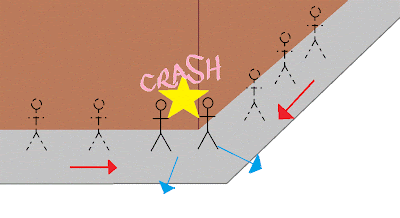We’re very used to our own impulses, and how to act on them (if they are to help an old lady across the street) or to control them (if they are more to do with ruining your mate’s art project) as the situation requires. They are often a knee-jerk emotional response that seems hard-wired into our DNA, and are sometimes just too delicious to resist (like licking your sister’s ice cream when she’s not looking). But in the world of Physics things are a little more controlled, although the one thing they have in common is that impulses occur in a very short space of time.
To look at impulses we have to first understand momentum. Momentum is the opposite of intertia (covered previously), and it’s a measure of how hard it is for a moving body to stop. It’s common in football commentary when they say that the player’s momentum took him into the guy that’s now rolling around on the floor, it’s not his fault. You will have experienced this too, for example if you’re walking along and someone steps out suddenly you may have been unable to avoid a collision.
And when this collision occurs, you don’t just stop still, and neither does the other person, they are inevitably (and some might say justly) jolted a little, or a lot, depending on how fast you were going. The contact happens in the blink of an eye and it is this transfer of your momentum to the unfortunate other person that is the impulse.
So we know from our own experience that the impulse comes from your momentum being interrupted and that what we feel depends on the speed of you and the other person, the time you’re in contact and the mass of the two people involved. These relationships can be written out then considering all these factors.
And it’s easy to see the links between these equations and what we feel when we’re subjected to an impulse. Now, questions that you will be faced with won’t talk about people as they have a habit of taking control of the situation themselves, unlike snooker balls for instance, but the principles are all the same. If you’re having trouble working out the answer, try to play out the situation in your head and see if you already know sort-of what will happen. This is a great way of making sure that whatever answer you get is sensible!


No comments:
Post a Comment